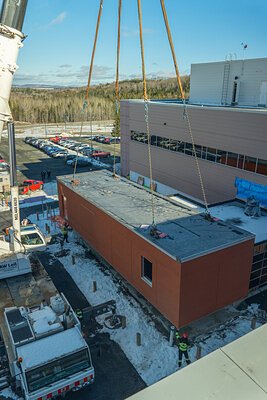
Modular Construction Speeds Up Healthcare Access: New MRI Suite Opens in New Brunswick
A new modular MRI suite at Upper River Valley Hospital is reducing wait times and expanding diagnostic imaging services in New Brunswick, showcasing a faster, more cost-effective approach to healthcare infrastructure.
Modular Construction Speeds Up Healthcare Access: New MRI Suite Opens in New Brunswick
WATERTOWN, NB – November 21, 2025
A new, state-of-the-art MRI suite at Upper River Valley Hospital (URVH) in Waterville, New Brunswick, is poised to dramatically improve access to critical diagnostic imaging services in the region. The facility, constructed using innovative modular building techniques, represents a growing trend in healthcare infrastructure – one focused on speed, efficiency, and minimized disruption.
Faster Construction, Reduced Costs
The 110,000-pound MRI suite was delivered and installed earlier this month, a process completed in under ten months from contract award – significantly faster than traditional construction methods. This expedited timeline was made possible by SDI Canada, a leader in medical infrastructure solutions, who prefabricated the module off-site while site preparation occurred concurrently. The unit was transported over 2,400 kilometers, requiring a specialized 130-foot super-load truck and a 250-ton crane for installation.
“The speed of this project is truly remarkable,” said a hospital administrator. “Traditional construction would have taken considerably longer, delaying access to this vital service for our patients.”
The benefits of modular construction extend beyond speed. Experts suggest it can also lead to cost savings, with some estimates indicating potential reductions of up to 20% compared to conventional building methods. The controlled factory environment allows for enhanced quality control and minimizes waste. Furthermore, construction occurs with significantly less disruption to ongoing hospital operations, a crucial benefit for active healthcare facilities.
Addressing a Critical Need in New Brunswick
The new MRI suite comes at a crucial time for New Brunswick, a province historically challenged by lengthy wait times for diagnostic imaging. Prior to the installation, URVH relied on a portable MRI unit shared with Campbellton, which was only available for limited periods each month. This resulted in significant delays for patients requiring MRI scans, with average wait times exceeding 365 days for non-urgent cases.
“The lack of consistent access to MRI services created a bottleneck in our diagnostic capabilities,” explained a local physician. “Patients were forced to wait months for crucial scans, impacting their care and delaying diagnoses.”
The permanent installation of a dedicated, state-of-the-art 1.5 Tesla MRI at URVH is expected to more than double the hospital’s capacity for MRI exams. This expansion is projected to significantly reduce wait times and improve access to diagnostic imaging for residents throughout the Upper River Valley and beyond. The new unit will also enable the hospital to perform a wider range of specialized MRI scans locally, reducing the need for patients to travel to other facilities.
A Growing Trend in Healthcare Infrastructure
The URVH project is part of a broader trend toward modular construction in healthcare. Driven by the need for faster, more cost-effective, and less disruptive infrastructure solutions, hospitals and healthcare systems across Canada are increasingly adopting modular building techniques.
SDI Canada has been at the forefront of this movement, with a track record of successfully delivering modular MRI suites and other specialized medical facilities. The company previously completed what it claims was the first modular MRI department in Canada at Winnipeg Health Sciences Centre, and has undertaken projects at leading hospitals in Toronto and Montreal.
“The healthcare landscape is constantly evolving,” said a construction industry analyst. “Modular construction offers a flexible and adaptable solution that allows healthcare systems to respond quickly to changing needs and demands. This is particularly important in a post-pandemic world, where healthcare infrastructure must be resilient and adaptable.”
Horizon Health Network, which oversees URVH, has committed to recruiting and training specialized staff to operate the new MRI unit and ensure its long-term sustainability. The network has set a goal to achieve the national benchmark of providing elective MRI services within 60 days within the next two years. The province has also launched a feature within its MyHealthNB app to provide greater transparency for patients by displaying estimated wait times for medical imaging tests.
The innovative approach to construction taken at Upper River Valley Hospital is being viewed as a model for future healthcare infrastructure projects, demonstrating how modular building techniques can transform the delivery of vital medical services.
